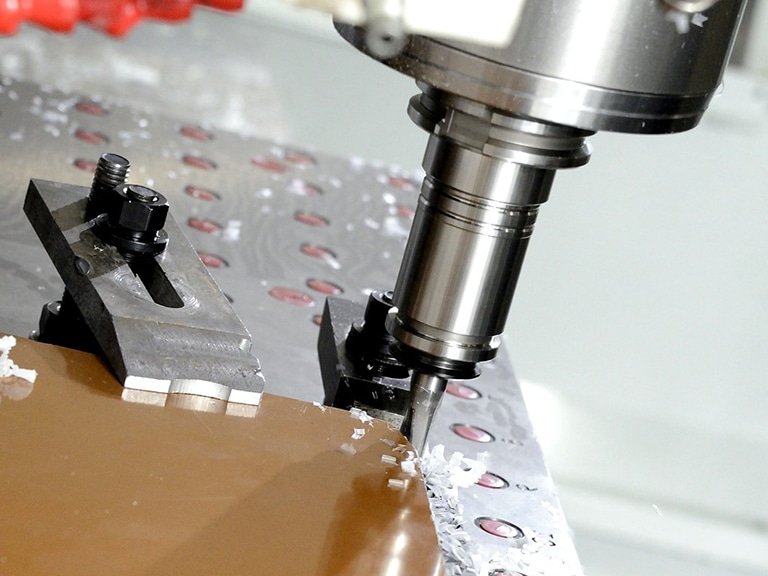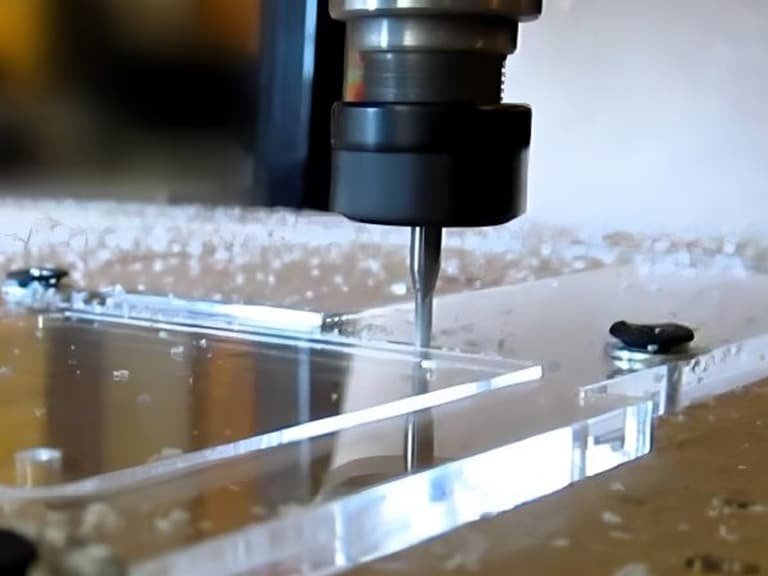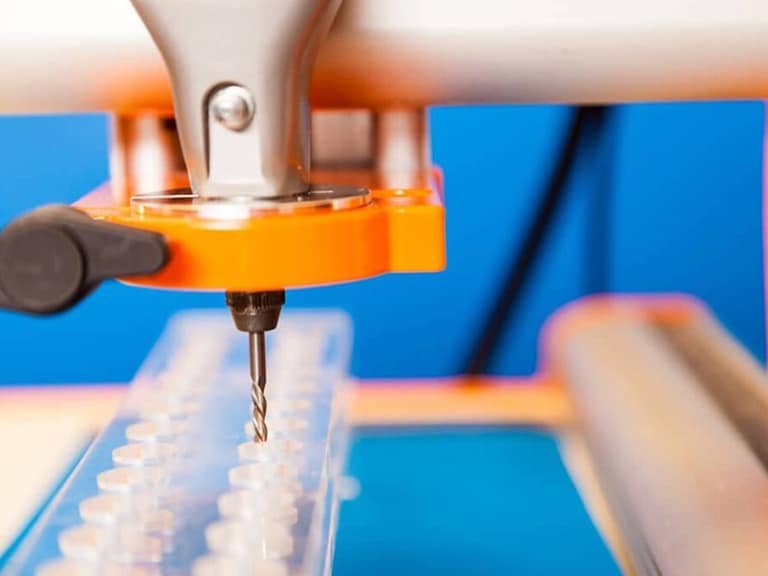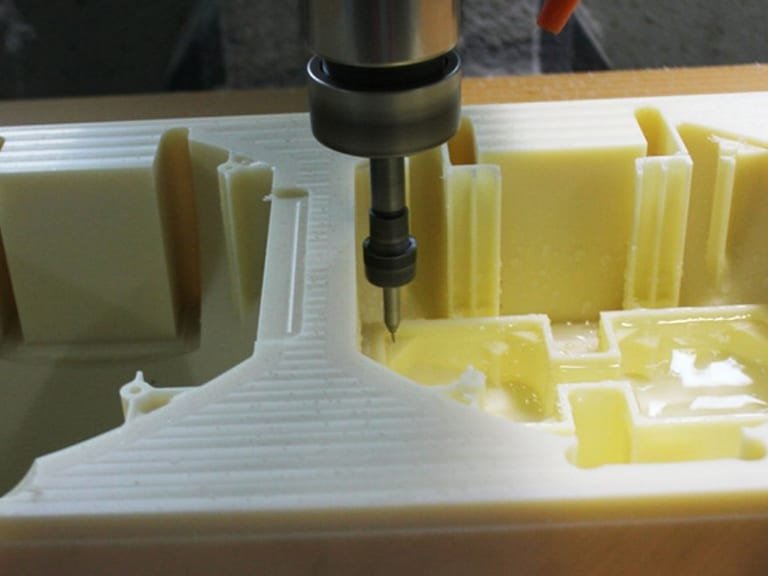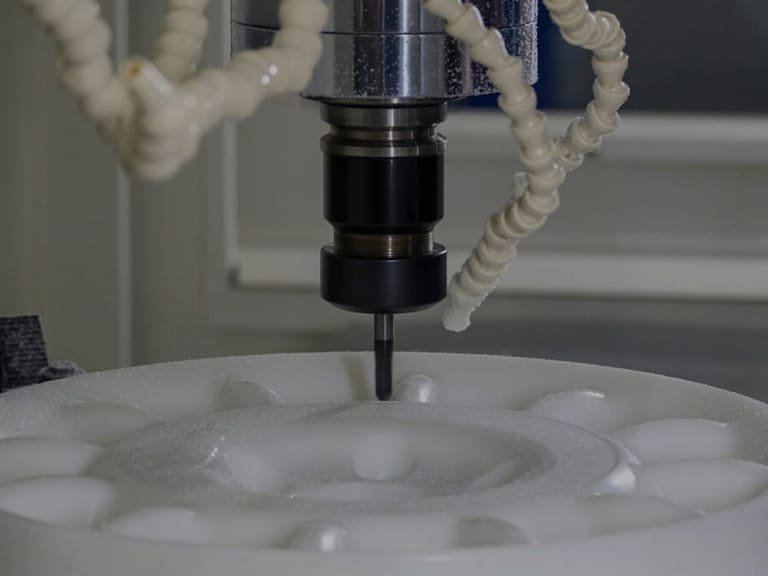Plastics are a top choice for machined parts across various industries. They offer a wide range of materials, surface finishes, and are cost-effective. Plastic materials’ versatility and CNC technology’s precision lead to optimal results. Choosing the right material is essential for successful machining outcomes.
At Yonglihao Machinery, we specialize in high-quality CNC machining solutions. Our technical expertise meets diverse manufacturing needs. This guide explores the wide range of CNC plastic machining. We’ll discuss their applications in various industries. The importance of material properties and proper selection will be highlighted.
Understanding Plastic for CNC Machining
CNC machining of plastics is crucial in modern manufacturing. It produces precise and complex parts. At Yonglihao Machinery, we offer high-quality CNC machining solutions. We deliver precise parts that meet design specifications while keeping costs low.
What Makes Plastics Suitable for CNC Machining
Plastics are ideal for CNC machining due to their machinability and dimensional stability. Their unique properties, such as lower melting points and reduced hardness, affect the machining process. These characteristics enable faster lead times and tighter tolerances, making plastics suitable for high-precision products.
- Machinability: Plastics can be easily machined using standard CNC tools.
- Dimensional stability: Plastics maintain their shape and size during the machining process.
- Response to cutting tools: Plastics can be cut and shaped with high precision.
Advantages of Using Plastics in Manufacturing
Using plastics in manufacturing offers several advantages. They are lighter than metals, resistant to corrosion, provide electrical insulation, and are cost-effective. CNC machined plastic parts offer excellent dimensional accuracy and can achieve tight tolerances. Plastics also offer design flexibility, allowing for complex geometries.
- Weight reduction: Plastics are generally lighter than metals.
- Corrosion resistance: Many plastics are resistant to corrosion.
- Electrical insulation: Plastics can provide excellent electrical insulation.
- Cost-effectiveness: Plastics can be more cost-effective than metals for many applications.
Common Types of Plastic Materials for CNC Machining
The choice of plastic material for CNC machining is critical. It affects the machining process and the final product’s performance. CNC machining is compatible with various plastic materials, including thermoplastics, thermosets, and elastomers, provided they are rigid enough to withstand cutting forces.
Thermoplastics vs. Thermosets
Thermoplastics and thermosets are fundamental categories of plastics used in CNC machining. Thermoplastics can be repeatedly melted and reformed, making them versatile.
In contrast, thermosetting plastics undergo permanent chemical changes after curing. As a result, they offer excellent heat resistance and dimensional stability. Understanding these differences is critical to selecting the right material for a specific project.
Engineering Plastics vs. Commodity Plastics
Engineering plastics are designed for their mechanical performance, strength, and temperature resistance. They are suitable for demanding applications.
Commercial plastics, on the other hand, are general-purpose materials that are less expensive but lack special properties. The choice between these plastics depends on the performance requirements and cost considerations of the project.
Filled and Unfilled Plastics
Plastics can be categorized into filled and unfilled types. Filled plastics contain additives like glass fiber, carbon fiber, or minerals. These additives enhance their strength, stiffness, and dimensional stability. Unfilled plastics, while less robust, offer better surface finish and are often less expensive. The decision between filled and unfilled plastics affects both the machining process and the final product’s characteristics.
| Plastic Type | Characteristics | Applications |
| Thermoplastics | Can be melted and reformed multiple times | General-purpose parts, consumer products |
| Thermosets | Undergoes a permanent chemical change when cured | High-temperature applications, electrical components |
| Engineering Plastics | High mechanical performance, strength, and temperature resistance | Aerospace, automotive, industrial machinery |
| Commodity Plastics | General-purpose, less expensive | Consumer goods, packaging |
| Filled Plastics | Enhanced strength, stiffness, and dimensional stability | Structural components, mechanical parts |
| Unfilled Plastics | Better surface finish, less expensive | Consumer products, cosmetic parts |
ABS and Polycarbonate
ABS material and polycarbonate are top choices for CNC machining. They are versatile and widely used. We’ll look at their properties and applications, highlighting their benefits and differences.
ABS Properties and Applications
ABS is a widely used engineering plastic. It is lightweight and has excellent processing properties. In addition, ABS has outstanding impact resistance and heat resistance. Its excellent processing properties and cost-effectiveness make it an ideal choice for prototypes, functional components, and production components in multiple industries.
ABS is often used for rapid prototyping due to its low cost and effective results. Furthermore, its excellent insulation properties and long-term mechanical stability make it suitable for electrical applications.
Polycarbonate Characteristics and Uses
Polycarbonate is known for its toughness, electrical insulation, and lightness. It’s as clear as glass and retains heat well. This makes it very efficient.
Its unique mix of clarity and impact resistance makes polycarbonate stand out. It’s ideal for medical devices, safety gear, optical parts, and electronic displays.
ABS and polycarbonate are both versatile, but they have different strengths. ABS is great for impact resistance and stability, while polycarbonate shines in clarity and impact resistance. Knowing these differences helps you choose the right material for your project.
High-Performance Plastics
High-performance plastics like PEEK and PEI are changing CNC machining. They meet the tough needs of industries like aerospace, automotive, and medicine.
PEEK: Properties and Industrial Applications
PEEK is a semi-crystalline thermoplastic with amazing mechanical properties. It can handle high heat up to 260°C (500°F) and resists chemicals well. It’s also biocompatible and recyclable, making it perfect for medical and aerospace fields. PEEK has fatigue, liquid, and chemical resistance under a variety of conditions. This makes it ideal for use in harsh environments.
PEI (ULTEM): Characteristics and Uses
PEI, or polyetherimide. It is renowned for its high mechanical strength, wear resistance, and excellent hydrolysis resistance. Its amber appearance, outstanding thermal stability, flame retardancy, and dimensional stability make it suitable for a wide range of special applications.
PEI also has excellent electrical properties and resistance to repeated sterilization. It is widely used in aerospace components, medical equipment, and semiconductor manufacturing equipment.
Acetal (POM) and Nylon
Engineers often choose polyoxymethylene (POM) and nylon for CNC machining. This is because they have excellent mechanical properties. These plastics are favored for mechanical components because of their outstanding attributes.
Acetal (Delrin): Properties and Applications
Acetal, also known as Delrin, is a highly machinable plastic with high stiffness and strength. It resists fuel, wear, heat, weather, and chemicals well. This makes it perfect for precise CNC machined parts. Delrin 150 and Delrin 579 are common grades known for excellent dimensional stability.
Nylon (Polyamide): Characteristics and Uses
Nylon, or polyamide (PA), is a low-friction engineering plastic. It has high-impact strength, good chemical resistance, and high abrasion resistance. Nylon 66 is widely used in CNC machining for its strength and durability. It’s ideal for medical devices and automotive parts.
Acetal and Nylon have unique benefits, making them suitable for different mechanical uses. Acetal is great for precision parts like gears and bearings due to its high stiffness and low friction. Nylon is better for dynamic applications because of its toughness and self-lubricating properties.
Choosing between Acetal and Nylon depends on factors like moisture absorption, chemical environment, and load requirements. Understanding each material’s properties helps engineers make informed CNC machining decisions.
Specialty Plastics
In CNC machining, some plastics stand out for their exceptional properties and applications. We delve into three specialty plastics that are making a big impact across various industries.
PTFE (Teflon): Properties and Applications
PTFE, commonly known as Teflon, is highly regarded for its excellent chemical resistance, non-stick properties, and high temperature resistance of up to 260°C. Its applications span chemical processing, food equipment, electrical insulation, and medical devices. Its unique properties play an invaluable role in these fields.
HDPE: Characteristics and Uses
High-density polyethylene (HDPE) is a versatile plastic. It is known for its excellent impact strength, chemical resistance, and moisture resistance. It can be used to manufacture chemical tanks, cutting boards, outdoor furniture, and fluid handling components. Its durability and resilience make it extremely advantageous.
UHMW: Properties and Industrial Applications
Ultra-high molecular weight polyethylene (UHMW) is renowned for its exceptional wear resistance, impact strength, and low friction coefficient. It is an ideal material for industrial applications where durability and performance are critical. This material is suitable for manufacturing conveyor components, wear strips, bumpers, and food processing equipment, among other applications.
These specialty plastics – PTFE, HDPE, and UHMW – are revolutionizing industries with their unique properties and applications in CNC machining.
Key Properties to Consider When Selecting Plastic for CNC Machining
To achieve optimal results in CNC machining, evaluating plastic material properties is crucial. The right plastic selection significantly impacts the machining process and the final product’s performance.
Mechanical Properties: Strength, Hardness, and Impact Resistance
Mechanical properties like tensile strength, flexural modulus, hardness, and impact resistance are key. They determine how plastic behaves during CNC machining and in its application. For example, hardness and tensile strength affect chip formation and surface finish. We help you understand mechanical property data sheets to apply specifications effectively.
Thermal Properties: Heat Resistance and Thermal Expansion
Thermal properties, including heat deflection temperature, continuous service temperature, and coefficient of thermal expansion, are essential. Elevated temperatures can cause plastics to expand. Since the thermal expansion coefficient of plastic is higher than that of metal. Therefore, this will affect parts with strict tolerances or in environments with temperature changes.
Chemical Resistance and Environmental Stability
The chemical resistance and environmental stability of a plastic material are critical. Plastics like nylon, acrylic, ABS, and PC may absorb moisture or react with chemicals, UV radiation, or other environmental factors. Understanding these properties is key to selecting materials that maintain their integrity in their intended environment.
By considering these key properties and balancing them against cost. Then, we can make informed material selection decisions. This ensures performance without unnecessary expense. It’s essential to consider the part’s entire lifecycle, from machining to service life, when selecting plastic materials for CNC machining.
Industry-Specific Applications of CNC Machined Plastics
Industries are leveraging CNC machined plastics’ unique properties to create innovative products. The versatility of CNC machining allows for the production of complex plastic parts that meet various industry requirements.
Automotive and Aerospace Applications
In the automotive and aerospace sectors, CNC machined plastics are used to replace metals. This reduces weight and cost while maintaining high performance. Common polymers like ABS, PVC, and PC are used for interior and exterior vehicle parts, such as bumpers and handles. High-performance plastics like PEEK, PEI, and reinforced nylons are used in demanding applications. These include under-hood parts and specialized aerospace components.
- Lightweight, high-performance plastics are used in automotive and aerospace applications.
- Materials like PEEK and PEI meet the demanding requirements of these industries.
Medical and Healthcare Uses
In the medical sector, CNC machined plastics are used to create medical instruments and implants. Biocompatible plastics like PEEK, acrylic, and medical-grade polycarbonate are used for device design and surgical instruments. The precision of CNC machining enables the creation of complex medical devices with exact specifications and sterilization capabilities.
- Biocompatible plastics are used for medical devices and implants.
- CNC machining allows for precise and complex medical device manufacturing.
Electronics and Consumer Products
CNC machined plastics are also used in the electronics and consumer products industries. Plastics’ electrical insulation properties, moldability, and aesthetic qualities make them ideal for enclosures and connectors. Materials like ABS and polycarbonate are selected for their impact resistance, heat dissipation, and attractive appearance.
- Plastics are used for enclosures and structural components in electronics.
- Material selection varies based on performance requirements and regulatory considerations.
Post-Processing Options for CNC Machined Plastic Parts
Post-processing is crucial for enhancing the quality and performance of CNC machined plastic parts. After CNC machining, parts may have rough edges, visible tool marks, or burrs. These need to be addressed to achieve the desired surface finish and functional characteristics.
Surface Finishing Techniques
Surface finishing techniques are vital for improving the aesthetic and functional properties of CNC machined plastic parts. Mechanical methods like sanding and polishing can be used to smooth out surfaces and remove imperfections. Sanding involves using progressively finer grits of sandpaper to achieve the desired finish.
For plastics that can achieve a high-gloss finish, polishing is used after sanding. Chemical methods like vapor polishing and solvent polishing can also be applied to certain plastics to enhance their surface quality.
- Sanding: Removes burrs and imperfections, preparing the part for coating or achieving a smooth finish.
- Polishing: Creates a high-gloss finish on plastics capable of achieving such a finish.
- Vapor Polishing: A chemical method that smooths out the surface of certain plastics.
Assembly and Secondary Operations
Assembly and secondary operations are crucial in CNC machined plastic parts production. Techniques like adhesive bonding, ultrasonic welding, and mechanical fastening join components. Operations such as thread forming and decorating enhance functionality and aesthetics.
- Adhesive Bonding: Joins plastic components using adhesives.
- Ultrasonic Welding: Uses high-frequency vibrations to melt and join plastics.
- Mechanical Fastening: Employs mechanical fasteners to assemble parts.
Considering post-processing early in design simplifies manufacturing. Proper post-processing boosts CNC machined plastic components’ value and performance. This makes them suitable for demanding applications.
Conclusion
Choosing the right plastic material is key to CNC machining success. The wide range of plastics available offers unique properties for various applications. When picking a plastic, balance performance needs with manufacturing limits. Consider functional requirements, environmental conditions, manufacturing, and cost constraints.
At Yonglihao Machinery, our expertise in metal and plastic CNC machining guides material selection and processing. We invite you to consult with our team for your CNC projects. Together, we aim for high-quality manufacturing solutions.
FAQ
What are the most common types of plastic used for CNC machining?
ABS, Polycarbonate, Acetal (POM), Nylon, PEEK, and PEI (ULTEM) are common. They offer high impact resistance, chemical resistance, and excellent mechanical properties.
How do I choose the right plastic material for my CNC machining project?
We evaluate mechanical, thermal, and chemical properties. This ensures the part meets specifications and performs well in its application.
What are the advantages of using plastics in manufacturing?
Plastics have a high strength-to-weight ratio, resist corrosion, and can be molded into complex shapes. They’re ideal for many industries, including automotive, aerospace, medical, and consumer products.
Can CNC machined plastics be used in high-temperature applications?
Yes, high-performance plastics like PEEK and PEI (ULTEM) are suitable for high-temperature use. They resist heat well and maintain mechanical properties in extreme environments.
How do I ensure dimensional stability in my CNC machined plastic parts?
We control the machining process to achieve dimensional stability. We consider material properties, tolerances, and post-processing techniques to minimize distortion.
What surface finishing options are available for CNC machined plastic parts?
We offer polishing, grinding, and coating to enhance appearance and performance. The choice depends on the material and application requirements.
Can CNC machined plastics be used in medical devices?
Yes, biocompatible plastics like PEEK and PEI (ULTEM) are used in medical devices. They offer excellent mechanical properties and resist sterilization processes, making them suitable for medical applications.




